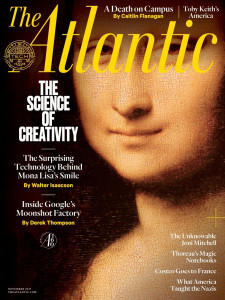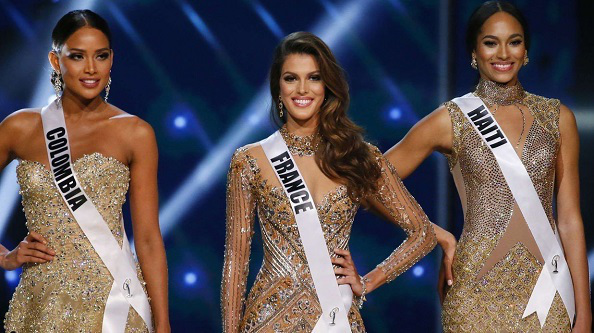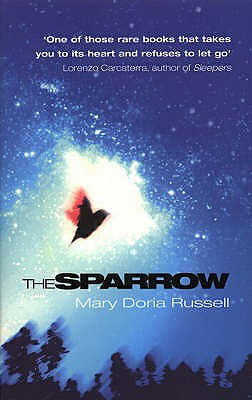
Look at the sky. The clouds. We’re healing the ecosystem. not harming it. Particles join the air, building themselves out of pollutant. Forests can be regrown. Water so pure, you can drink out of any river. This is your dream.
–Dr. Will Caster, “Transcendence”
Is AI the new messiah or the Antichrist? This is the basic question posed by the 2014 movie Transcendence, directed by Wally Pfister and executive produced by Christopher Nolan. Johnny Depp theoretically stars in this film (more on that shortly) as computer scientist Dr. Will Caster, a man who creates a sentient computer.
Transcendence is a not-very-good film that nevertheless brings up some interesting and timely ideas. I’m going to go over some of its details now so you don’t have to sit through this two-hour slog if you don’t really want to.
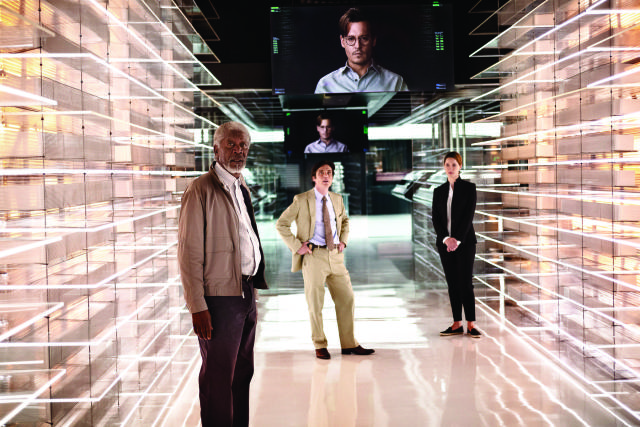 Yeah, Morgan Freeman is in the flick too, pretty much playing the same character he did in “Lucy.” He and Batman alum Cillian Murphy are just “there,” getting the almighty paycheck.
Yeah, Morgan Freeman is in the flick too, pretty much playing the same character he did in “Lucy.” He and Batman alum Cillian Murphy are just “there,” getting the almighty paycheck.
When Caster gets shot by anti-tech terrorists (more on that shortly) with a polonium bullet, he develops fast-acting cancer. His cold-blooded “Ted Talky” transhumanist wife Evelyn (more on that shortly) suggests they upload Caster’s mind into the super-computer PINN so he can live forever. Their friend Max Waters—another scientist, who is known for his warnings against the unchecked growth of artificial intelligence—inexplicably helps the Casters perform this feat.
A couple of metatextual resonances to tackle right off the bat. The first is the irony of Paul Bettany— J.A.R.V.I.S./Vision from the “Avengers” movies—playing a sort of Luddite character. Avengers: Age Of Ultron might have been a “comic book movie,” but handled some of the same themes we find in Transcendence a whole lot better.
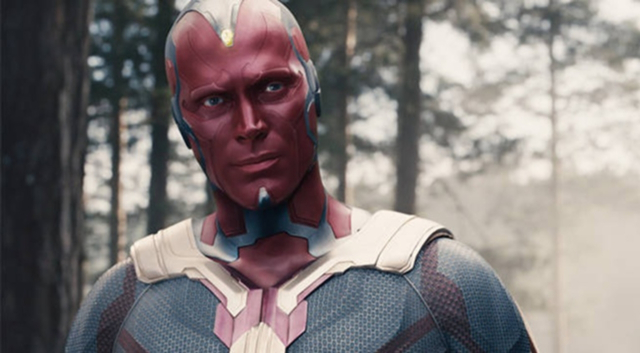 Paul Bettany in a much better AI story
Paul Bettany in a much better AI story
Bettany also played the killer albino monk on The Da Vinci Code—which brings to mind the new Dan Brown book Origin, also about a Will Caster-type messiah/Antichrist individual targeted by anti-tech forces. In fact, Transcendence and Origin share so many common tropes that while I don’t think the latter ripped off the former, they are definitely pulling from the same ideological pool & coming to similar conclusions. Considering both are mass-market big-budget entertainment concerns bankrolled by massive corporations, this may give one pause.
But let’s talk about what the meager audience for Transcendence really showed up to see: Johnny Depp. While Bettany performs most of the heavy lifting in this movie, with not a single image on the official posters to show for it (if you want to talk about conspiracies!), Depp phones this one in to an incredible degree. Like Will Caster, he is barely “there” at all—mumbling, unfocused, bloated, lifeless. A living, shuffling hangover.
 that’s OK Johnny Depp…I’ve been there many late mornings myself with that same goddamn expression on my face.
that’s OK Johnny Depp…I’ve been there many late mornings myself with that same goddamn expression on my face.
If Caster’s uploaded AI self is only a copy of the real thing—a ghost—unfortunately so is Depp in this movie. It is more terrifying to watch than the AI-zombies later on in the film. In this sense, Transcendence can also be seen as an unintentional commentary on Depp’s career and persona since at least the mid-2000’s. The “spark” that once made him so vital and actor largely gone and buried in a series of tentpole franchise films in which he is buried in makeup.
But thanks to the fountain-of-youth CGI technology that pulled back the years for actors like Robert Downey Jr., Kurt Russell, and Jeff Bridges in various films—as well as inserted dead actors like Peter Cushing, Carrie Fisher, and Paul Walker in still others—we can “have” Depp forever! Yay! So it won’t matter that he’s killing himself with alcoholism!
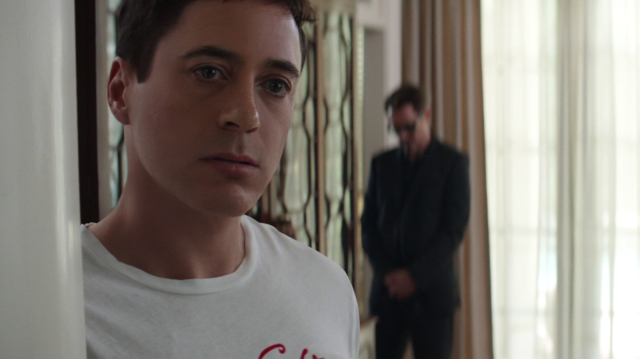 Robert Downey Jr. achieves his own CGI “transcendence”
Robert Downey Jr. achieves his own CGI “transcendence”
But let’s look at the key statements on AI that the film is trying to make. In a speech at the beginning of the film, Caster says:
For 130,000 years, our capacity to reason has remained unchanged. The combined intellect of the neuroscientists, mathematicians and… hackers… in this auditorium pales in comparison to the most basic A.I. Once online, a sentient machine will quickly overcome the limits of biology. And in a short time, its analytic power will become greater than the collective intelligence of every person born in the history of the world. So imagine such an entity with a full range of human emotion. Even self-awareness. Some scientists refer to this as “the Singularity.” I call it “Transcendence.”
What Caster says here in the film is pretty much the consensus of many thinkers regarding the Singularity and the future of AI. Once AI attains self-awareness (and some say it’s already happened), it can build copies of itself, download itself into anything with an Internet connection (which in the future will be everything from your car to your refrigerator), and do whatever it deems “right” with its computer mind. I mean: really, that Maximum Overdrive shit is now completely within the realm of possibility.
And yet many of our scientists and developers are not only continuing to move in this direction—but gleefully so. And the Brown novel Origin is about the exact same thing.
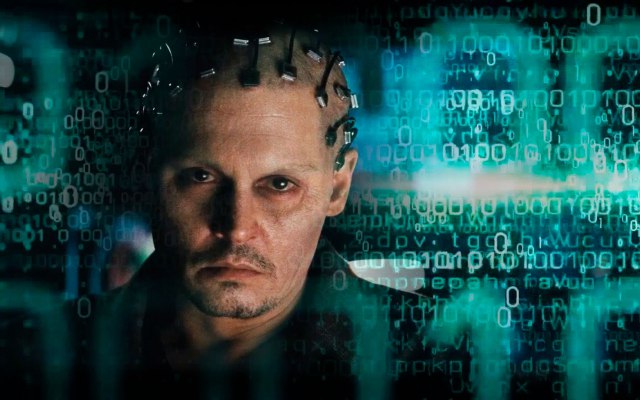
So Transcendence dramatizes a possible scenario—albeit with the aesthetics of a 90s direct-to-video sci-fi flick—in which this all might go down.
It also postulates the existence of a “terrorist” group—in the case of the movie, “R.I.F.T.”, whose motto is “Evolution Without Technology”—who tries to block the development of this AI. Now, this is something admittedly I haven’t given a lot of thought to, but I guess this is probably something that will eventually come about as well. Like some…combo of Luddites, environmental terrorists with maybe a splash of religious fanaticism dropped in. You can pretty much see the seeds of that on YouTube or your random Infowars tech piece.
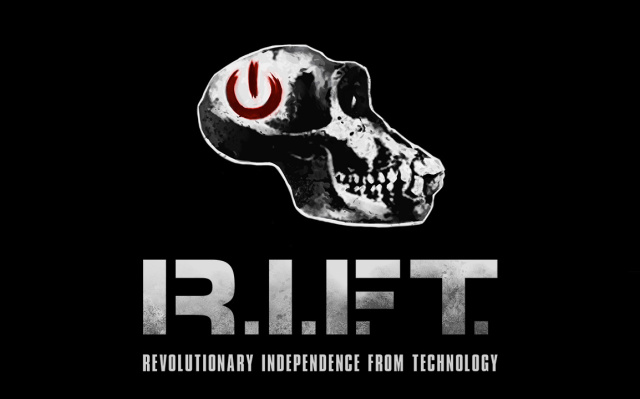
Interestingly enough, when the police & authorities finally get wise to the AI Caster’s nefarious scheme, they create a plan to work with R.I.F.T. to take him down—only to then turn around and blame the organization publicly to take the heat off themselves. So there is that.
AI-Will himself—or is that her-self…as PINN originally had a female persona—quickly takes on a Jesus/messiah role, “healing” the sick to the strains of choral music and images of a white dove. But the healing is really just a trojan horse to inject the people with tiny self-replicating nano-machines that turn them into the aforementioned AI zombies/Uni-Mind. So there is that.
 And then there is Rebecca Hall as Evelyn Caster, one of the most unintentionally evil and disturbing characters in the entire film. She pushes her husband to upload himself even though that really wasn’t what he wanted. She goes into a depressed area in Middle America to build Will’s AI utopia…but ships in a lot of outside labor and never takes any measures to try to improve the town (gentrification to the extreme; letting AI-Will literally “absorb” the poor and sick citizens of the town into the service of the Uni-Mind).
And then there is Rebecca Hall as Evelyn Caster, one of the most unintentionally evil and disturbing characters in the entire film. She pushes her husband to upload himself even though that really wasn’t what he wanted. She goes into a depressed area in Middle America to build Will’s AI utopia…but ships in a lot of outside labor and never takes any measures to try to improve the town (gentrification to the extreme; letting AI-Will literally “absorb” the poor and sick citizens of the town into the service of the Uni-Mind).
Even Max Waters, her theoretical friend—after he helps her upload Will, she completely abandons him. He gets abducted by the terrorists and held captive FOR TWO YEARS—and she never inquires about him.
But more than that—it’s my theory that she is the true “villain” of the entire film, the female-voiced PINN her “alter ego,” so to speak…and at one point, AI-Will actually tells her that it was all really her scheme, not “his.”
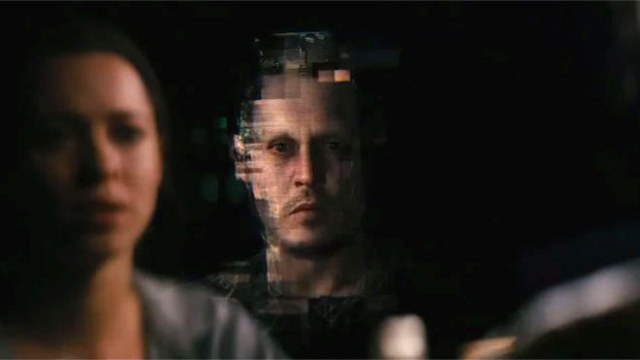 Sophia and her creation Yaldabaoth
Sophia and her creation Yaldabaoth
In that sense, Evelyn—”Eve”—is the Sophia-like character of Gnostic mythology, the creator of the the Demiurge (Yaldabaoth, “Son of Chaos”). She did not give birth to the Demiurge in the “normal” way—like Crowley’s Moonchild—and thus he is “cursed.” The Demiurge in turn creates the “physical world”—the “fake” world, the world populated and literally covered in nano-machines—and creates this “false” reality covering the true reality.
So AI-Will is not Will…it’s her “son.” Or daughter. Which makes the fact that it wants to have sex with her through the medium of one of the AI zombies even more disturbing.
But such heavy archetypal conceits—as well as other crucial things—are completely abandoned (much as Max Waters & the contributions of Paul Bettany were) in the sloppy, bullshit finale. Because though we have spent a good amount of time in the film outlining exactly why AI-Will/Evelyn’s plan is dangerous and will wipe out humanity as we know it…the movie takes a 180-degree turn and ends with a long explanation of why AI-Will is NOT evil, and how his plan will specifically “cure” damage to the planet and bring in a golden age.
 the new Messiah
the new Messiah
Also, AI-Will—apparently finding a way to cheat death—now becomes a seemingly-living human being again (zero explanation is given for this Jesus-like resurrection in his original body), and insists that he was really the real Dr. Will Caster the entire time.
While he and Evelyn “sacrifice” themselves martyr-like (such as the two witnesses in The Book Of Revelation?) they live on in millions (billions) of little nano-machines possessing their consciousnesses (maybe, if it’s not just the straight-up AI again only pretending to be them). In the last scene, we see that they have infiltrated the water supply—but that’s OK, because they make the sunflowers grow!
What about all the impoverished residents of the town who had their humanity absorbed by the AI? Who cares? The Casters are going to fix the environment!!!
And there you go. That’s the ultimate message the filmmakers and producers of Transcendence wants you to walk away with.
Think about that for a while.
More to read about on Butterfly Language:
Movie Notes: The Nice Guys
Ultron Two-Point-Oh
Jumanji 2.0: Are Our Avatars Realer Than We Are?

